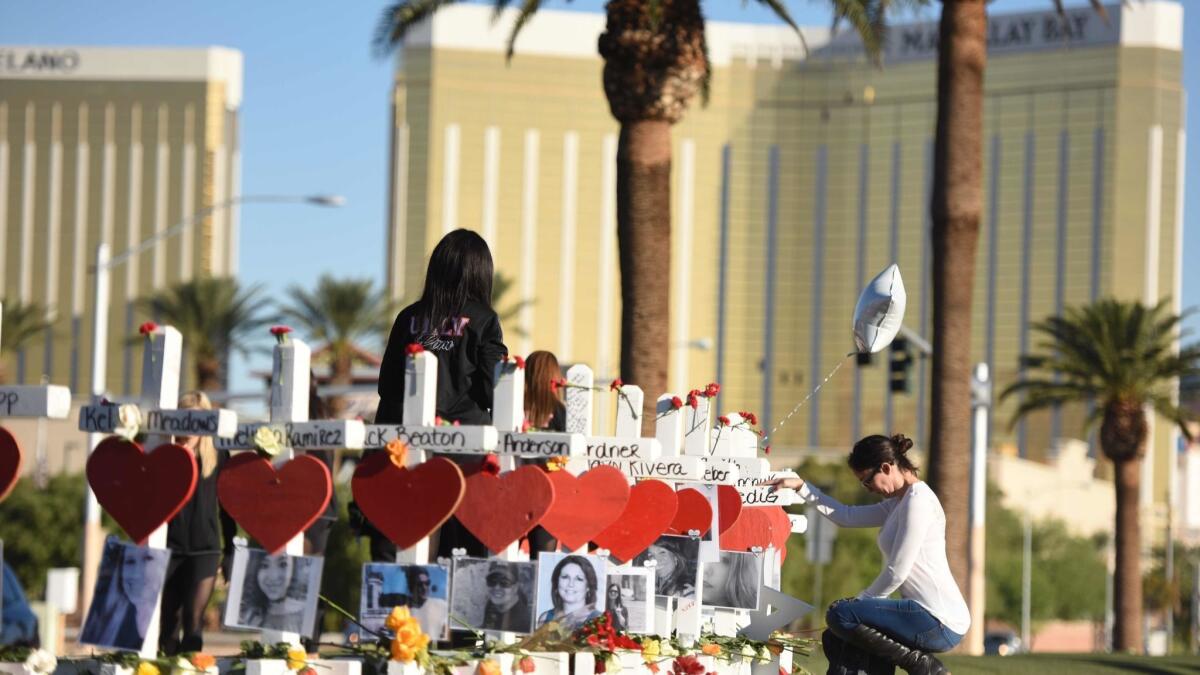FBI fails to find a motive behind Las Vegas mass shooting

- Share via
A high-stakes gambler who rained down gunfire from his high-rise hotel suite in Las Vegas, killing 58 people, wanted infamy and mass destruction, the FBI told the Associated Press on Tuesday, but took whatever other motive he had to his grave.
“It wasn’t about MGM, Mandalay Bay or a specific casino or venue,” said Aaron Rouse, the special agent in charge of the FBI’s Las Vegas office. “It was all about doing the maximum amount of damage and him obtaining some form of infamy.”
Rouse says Stephen Paddock acted alone when he planned and carried out the attack. The 64-year-old fatally shot himself as police closed in on his hotel suite.
Rouse says the reason for Paddock’s rampage remains a mystery after months of study by agents and behavioral specialists. Almost 900 people were injured during the Oct. 1, 2017, attack on an outdoor country music concert.
Paddock, 64, was a retired Postal Service worker, accountant and real estate investor who owned rental properties and homes in Reno and in a retirement community more than an hour’s drive from Las Vegas, held a private pilot’s license and liked to gamble tens of thousands of dollars at a time playing high-stakes video poker.
His bank robber father was once on the FBI’s most-wanted list. His younger brother, Eric Paddock, called him the “king of microaggression” — narcissistic, detail-oriented and maybe bored enough with life to plan an attack that would make him famous.
His ex-wife told investigators that he grew up with a single mom in a financially unstable home and felt a need to be self-reliant.
Police characterized him as a loner with no religious or political affiliations who began stockpiling weapons about a year before the attack, spent more than $1.5 million in the two years before the shooting and distanced himself from his girlfriend and family.
He sent his girlfriend Marilou Danley to visit her family in the Philippines two weeks before the attack and wired her $150,000 while she was there. Danley, a former casino worker in Reno, returned to the U.S. after the shooting and told authorities that Paddock had complained that he was sick and that doctors told him he had a “chemical imbalance” and could not cure him.
Danley, who is Catholic, told investigators that Paddock often told her, “‘Your God doesn’t love me.’”
A Reno car salesman told police that in the months before the shooting Paddock told him he was depressed and had relationship troubles, and his doctor offered him antidepressants but told police that Paddock would only accept a prescription for anxiety medication.
Yet Paddock’s gambling habits made him a sought-after casino patron. Mandalay Bay employees readily let him use a service elevator to take multiple suitcases to the $590-per-night suite he had been provided for free. Authorities said he asked for the room, which had a commanding view of the Strip and the Route 91 Harvest Festival concert grounds across the street.
The night of the massacre, Paddock fired more than 1,000 rounds with assault-style rifles in 11 minutes into the crowd of 22,000 country music fans. Most of the rifles were fitted with rapid-fire “bump stock” devices and high-capacity magazines. Some had bipods and scopes. Authorities said Paddock’s guns had been legally purchased.
Las Vegas police closed their investigation in August, and Clark County Sheriff Joe Lombardo declared the police work ended after hundreds of interviews and thousands of hours of investigative work. Lombardo vowed to never again speak Paddock’s name in public.
A separate report made public in August involving the Federal Emergency Management Agency found that communications were snarled during and after the shooting. It said police, fire and medical responders were overwhelmed by 911 calls, false reports of other shootings at Las Vegas casinos and the number of victims.
Hotel security video and police officer body camera recordings made public under court order in a public records lawsuit by media including the Associated Press showed police using explosives to blast through the door of the 32nd-floor hotel suite where Paddock was found dead from a self-inflicted gunshot wound. The Clark County coroner ruled his death a suicide.
Paddock left no note providing an explanation.
The volumes of police materials, including written reports and witness accounts, provided glimpses of horror, heroism and heart-wrenching drama. They did not provide a motive for Paddock’s actions.
More to Read
Sign up for Essential California
The most important California stories and recommendations in your inbox every morning.
You may occasionally receive promotional content from the Los Angeles Times.









